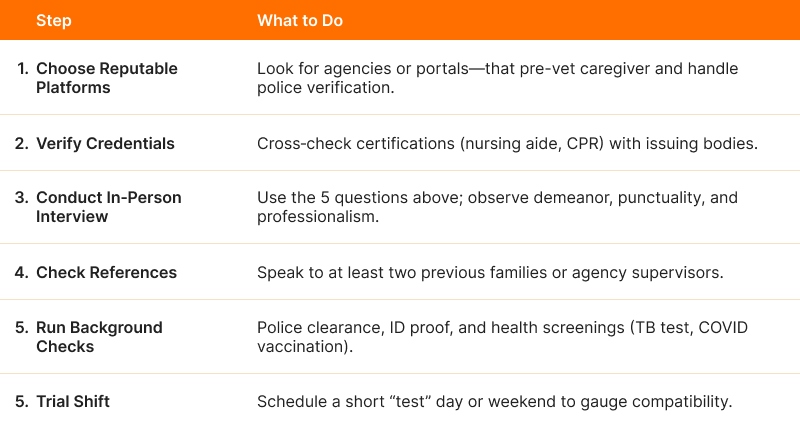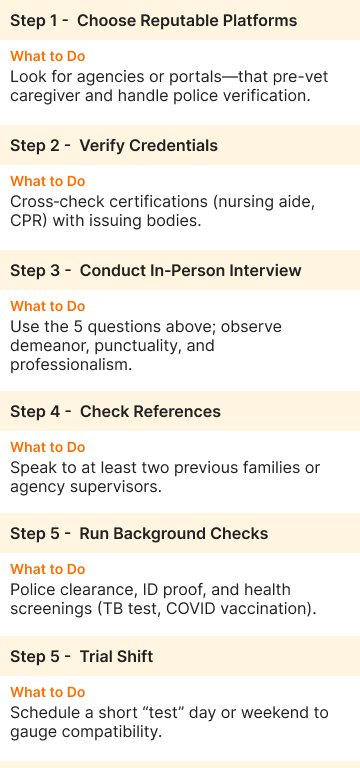Finding a caregiver you can trust is one of the most important decisions for families seeking peace of mind and quality support. Whether you need part‑time assistance or 24/7 care, a thorough interview process helps you separate truly dedicated professionals from the rest. Use these five essential questions, along with our red flags checklist and hiring platform tips, to make a confident choice.
1. Can You Walk Me Through Your Experience and Training?
Why it matters: Caregiving isn’t one‑size‑fits‑all. You want to know if they’ve worked with seniors who have similar needs—mobility limitations, dementia, post‑surgery recovery, etc.
What to listen for:
- Specific examples (“I’ve assisted three clients with Parkinson’s tremors…”)
- Relevant certifications (CPR, First Aid, Alzheimer’s care training)
- Continuous learning (“I completed a dementia‑care workshop last month.”)
2. How Do You Handle Medical Emergencies or Sudden Health Changes?
Why it matters: A caregiver’s calm, competent response can be lifesaving.
What to listen for:
- Clear protocols (“I keep my client’s emergency contacts and doctor’s details by the bedside…”)
- Prior experience (“When my previous client fell, I administered first aid and alerted the family immediately…”)
3. What Is Your Approach to Daily Routines and Personal Preferences?
Why it matters: Compatibility and respect for your loved one’s habits—meal times, prayer routines, favorite pastimes—build trust and comfort.
What to listen for:
- Flexibility (“I always ask my clients how they’d like their day to unfold…”)
- Examples of personalization (“I learned my last client loved Hindi film songs, so we’d play music during walks.”)
4. Can You Provide References and Consent to a Background Check?
Why it matters: Verifying identity, past employment, and character protects your family from risks.
What to listen for:
- Willingness to share contact information for 2–3 past families or agencies
- Openness to police verification or third‑party background screening
5. How Do You Communicate with Families About Day‑to‑Day Updates?
Why it matters: Regular, transparent check‑ins keep you involved and reassured—even if you’re far away.
What to listen for:
- Preferred channels (WhatsApp voice notes, daily logs, quick calls)
- Consistency (“I send a short SMS at day’s end and call weekly to discuss anything out of the ordinary.”)
5. How Do You Communicate with Families About Day‑to‑Day Updates?
Vague Answers: If they can’t cite specific examples or detail their routine.
Reluctance on References: Hesitation to share former employers or pass background checks.
Inflexibility: Unwillingness to adapt to your loved one’s preferences or schedule.
Poor Communication: Delayed replies, unclear updates, or disappearing for days without notice.
Hiring Platforms & Background‑Check Checklist


Final Thoughts
Choosing the right caregiver is about skills + empathy + trust. Invest time in these five interview questions, watch for red flags, and follow a structured background‑check process. The result? A compassionate professional who brings safety and joy to your loved one’s daily life.




Gaurav Dhingra
July 5, 2025 at 8:53 amFinding a right person to take care of the elders is a real challenge.